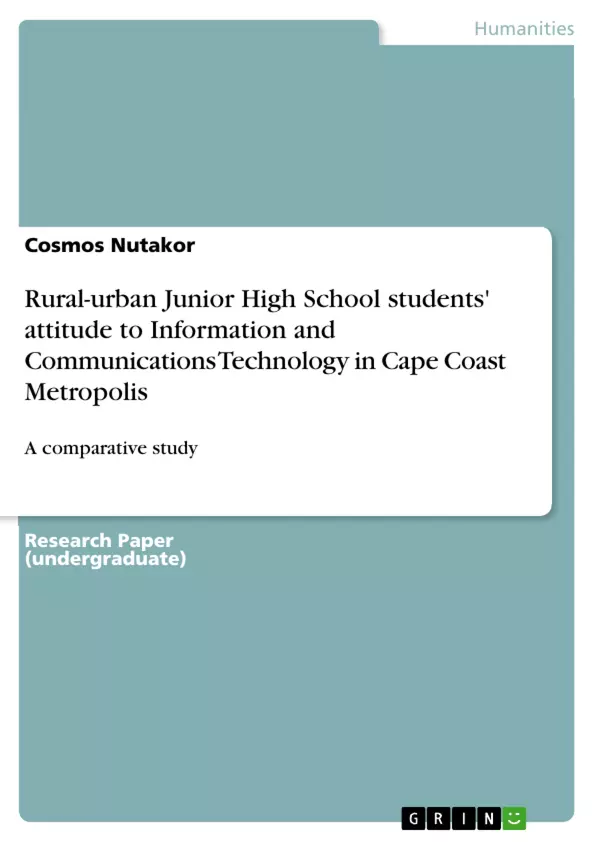This paper assessed attitude of students in selected rural and urban Junior High School in Cape Coast Metropolis towards the study of Information and Communications Technology (ICT). Descriptive research design was adopted and questionnaire was administered to 203 students from selected Junior High Schools in rural and urban areas which are located in the Metropolis. Predictive Analytics Software (PASW) version 18 for Windows was used to analyse the data. Frequency and Independent t-test were the tools used to aid in data analysis with respect to demographic characteristics and test the two hypotheses formulated to guide the study respectively. The result from the study has revealed that there is a significant difference in attitudes of Junior High School students in rural and urban areas and in terms of gender; the study points to the fact that there is no significant difference in the attitude of male and female students towards the study of ICT in the Cape Coast Metropolis.
Inhaltsverzeichnis (Table of Contents)
- Introduction
- Research Problem
- Hypotheses
- Related Literature Review
- Methodology
- Research Design
- Sample and Population
- Sampling Technique
- Instrument Development and Administration
- Data Analysis
- Results and Discussion
- Demographic Data
- Students' Attitude to ICT
- Rural and Urban Differences
- Gender Differences
- Factors Affecting Attitude to ICT
- Summary, Conclusion and Recommendations
Zielsetzung und Themenschwerpunkte (Objectives and Key Themes)
This paper investigates the attitudes of Junior High School students in Cape Coast Metropolis towards Information and Communications Technology (ICT). The study aims to understand how student attitudes differ between rural and urban schools and between male and female students. Key themes include: * **Student attitudes towards ICT:** Exploring students' perceptions and feelings about ICT and its importance in their education. * **Rural-urban differences in ICT attitudes:** Examining how student attitudes vary based on their location and the resources available in their schools. * **Gender differences in ICT attitudes:** Analyzing if there are significant differences in attitudes between male and female students. * **Factors affecting ICT attitudes:** Identifying the key factors that influence students' views on ICT, including individual characteristics, classroom experiences, and societal influences. * **The impact of ICT education on students' academic achievement:** Exploring the connection between students' attitudes towards ICT and their performance in ICT-related subjects.Zusammenfassung der Kapitel (Chapter Summaries)
This preview does not contain summaries of the conclusion or any sections containing major revelations or spoilers.Introduction
The introduction provides background information on the importance of ICT in modern society and education, highlighting its potential for economic development. It explains the inclusion of ICT in the Ghanaian education system and the government's efforts to make it accessible to all students. The introduction also discusses the rationale for focusing on students' attitudes towards ICT, as positive attitudes are essential for successful ICT integration in schools.Research Problem
The research problem explores the concern that students may have negative attitudes towards ICT, highlighting the need for further investigation. The study specifically focuses on the potential differences in attitudes between rural and urban students, as well as male and female students. The introduction also reviews existing research on ICT attitudes in Ghana.Related Literature Review
The related literature review presents the Planned Behaviour Theory, which offers a framework for understanding the factors that influence attitudes. The theory considers individual, demographic, and environmental factors that contribute to the formation of attitudes and behaviors.Methodology
The methodology section outlines the research design, sample selection, data collection methods, and data analysis techniques used in the study. This section provides detailed information about the procedures followed to ensure the scientific rigor of the research.Results and Discussion
The results and discussion section present the findings of the study, focusing on student demographics, attitudes towards ICT, and the factors influencing these attitudes. The section will likely include analyses of the differences in attitudes between rural and urban students, as well as male and female students.Schlüsselwörter (Keywords)
This study focuses on the attitudes of Junior High School students towards ICT in Cape Coast Metropolis, Ghana. Key terms include: ICT attitudes, rural-urban differences, gender differences, factors affecting ICT attitudes, student demographics, education in Ghana, and ICT integration in schools.Frequently Asked Questions
What was the main finding regarding students' attitudes towards ICT in Cape Coast?
The study found a significant difference in attitudes between students in rural and urban areas, but no significant difference between male and female students.
Which theory was used to understand student attitudes?
The study utilized the Planned Behaviour Theory as a framework to analyze factors influencing attitudes and behaviors.
Why is ICT education important in Ghana?
ICT is seen as a vital tool for economic development and modern education, leading the Ghanaian government to include it in the national curriculum.
How many students participated in the study?
The sample consisted of 203 Junior High School students from selected schools in the Cape Coast Metropolis.
What methodology was applied for data analysis?
The researcher used descriptive research design, applying Frequency and Independent t-tests via PASW software version 18.
- Quote paper
- Cosmos Nutakor (Author), 2015, Rural-urban Junior High School students' attitude to Information and Communications Technology in Cape Coast Metropolis, Munich, GRIN Verlag, https://www.grin.com/document/294608



